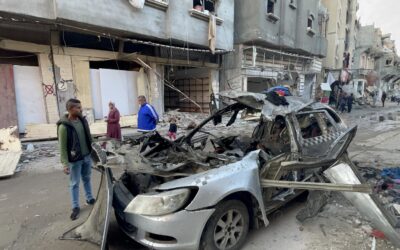
The Case For Investing in Wartime Ukraine
SUBSCRIBER+EXCLUSIVE INTERVIEW — While Ukraine deals with shortages of troops, munitions, and equipment for its air defenses, some Ukrainians are teaming up with foreign investors […] More
Bottom Line Up Front
The U.S. has long grappled with the desire to exert hard and soft power in the world while eschewing the realities of what it takes to sustain that power. Political leaders of both parties decry the role of ‘global policeman,’ while at the same time demanding the ability to wield influence abroad. When it comes to international peacekeeping efforts, the U.S. has assumed the role of a reluctant funder rather than on-the-ground fighter. The long-simmering objection to U.S. spending on what some perceive as wasteful and ineffective U.N. operations has reached a fever pitch within the Trump administration, which is openly hostile to the U.N. in general, and peacekeeping operations in particular.
In December 2018, U.S. National Security Advisor John Bolton spoke about the U.S’ possible steps to reduce its funding of U.N. peacekeeping operations. The U.S. funds approximately 22% of the U.N.’s regular budget but funds around 28% of the funding specifically for peacekeeping – approximately $2.2 billion. China is the second largest funder of U.N. peacekeeping operations, at over 10% of the 2018-2019 budget of $6.7 billion. According to the U.N, there are currently 14 peacekeeping operations: United Nations Mission for Justice Support in Haiti (MINUJUSTH); United Nations Mission for the Referendum in Western Sahara (MINURSO); United Nations Multidimensional Integrated Stabilization Mission in the Central African Republic(MINUSCA); United Nations Multidimensional Integrated Stabilization Mission in Mali (MINUSMA); United Nations Organization Stabilization Mission in the Democratic Republic of the Congo (MONUSCO); African Union – United Nations Hybrid Operation in Darfur (UNAMID); United Nations Disengagement Observer Force-Golan(UNDOF); United Nations Peacekeeping Force in Cyprus (UNFICYP); United Nations Interim Force in Lebanon(UNIFIL); United Nations Interim Security Force for Abyei (UNISFA); United Nations Interim Administration Mission in Kosovo (UNMIK); United Nations Mission in the Republic of South Sudan (UNMISS); United Nations Military Observer Group in India and Pakistan (UNMOGIP); United Nations Truce Supervision Organization (UNTSO).
These operations involve more than 100,000 personnel from 125 countries as of 2018. These personnel are primarily uniformed soldiers who don the ‘blue helmets’ of the U.N peacekeeping forces, along with police officers. The top contributors of deployed personnel are Ethiopia, Bangladesh, Rwanda, India, Nepal, and Pakistan. The U.S. commits very few staff on the ground for U.N. missions, with only 41 people formally assigned as of January 2019.
Several active peacekeeping operations have been ongoing for decades. The UNTSO in Jerusalem, which began in 1948, was the first U.N. peacekeeping mission; UNFICYP in Cyprus has been in place since 1964. MONUSCO in the Democratic Republic of the Congo has the largest deployment, at over 15,000 personnel; UNMISS in South Sudan has over 14,000. The U.S. has specifically criticized UNMISS, saying the U.S. ‘will not provide loans or more American resources to a South Sudanese government led by the same morally bankrupt leaders.’
There is a real need for reform and accountability in terms of U.N. peacekeeping operations, and the U.N has been rightfully criticized for abysmal accountability for crimes and atrocities, including allegations of rape committed by forces wearing the blue helmets. There are real costs to cutting funds to peacekeeping operations at a time of rising conflicts across the world. The international community has shown a real inability to resolve longstanding conflicts, requiring more, not less, need for peacekeeping capacities. It is crucial that the U.S., as it is doing across a broad spectrum of foreign policy issues, does not walk away from needs that it alone is best suited to address.
Related Articles

SUBSCRIBER+EXCLUSIVE INTERVIEW — While Ukraine deals with shortages of troops, munitions, and equipment for its air defenses, some Ukrainians are teaming up with foreign investors […] More

SUBSCRIBER+EXCLUSIVE INTERVIEW — With a mere 1.2 million citizens, Estonia is among NATO’s smallest members, but its contributions to Ukraine have led the pack by […] More

SUBSCRIBER+EXCLUSIVE BRIEFING — Drone weapons are part of the daily narrative of the war in Ukraine – from Russia’s use of Iranian drones against infrastructure […] More

SUBSCRIBER+ EXCLUSIVE ANALYSIS — Iran’s retaliatory strikes against Israel this weekend were both a potentially game-changing, historic first — and an underwhelming response. Historic, because […] More

SUBSCRIBER+EXCLUSIVE INTERVIEW — Ukraine was hit by a fresh round of Russian missile attacks on Thursday, strikes that targeted and damaged the country’s power grid […] More

SUBSCRIBER+ EXCLUSIVE REPORTING — The Israeli drone strike that killed three adult sons (who Israel says were Hamas operatives) and four grandchildren of Hamas’s Qatar-based […] More
Search